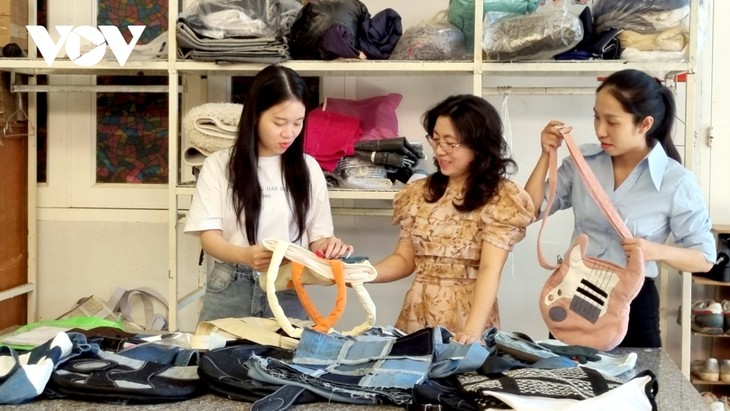(VOVWORLD) - Many women in the Central Highlands province of Dak Lak have made the most of discarded materials to create new goods, more jobs, and income. This method of recycling has also contributed to environmental protection toward green consumption.
 Ly Thi Kim Binh’s facility recycles old denim fabric into bags. Ly Thi Kim Binh’s facility recycles old denim fabric into bags. |
After producing bags from recycled denim cloth for 7 years, Ly Thi Kim Binh of Buon Ma Thuot city established a facility that employees 5 workers. It sells more than 7,500 fabric bags per year, earning nearly 60,000 USD. Binh said that initially she only recycled old clothes into new items.
“My children design the products and I sew them. They sell them online and have a lot of customers. I plan to set up an offline sales channel and promote an awareness of the need to reduce the amount of waste released into the environment,” Binh said.
 Products made from areca spathes by Dao Thi Van Products made from areca spathes by Dao Thi Van |
During a visit to a production model in Quang Ngai province, Dao Thi Van of Buon Ma Thuot city came up with the idea of starting a business that makes dishes from areca spathes. After studying the raw materials that can be found in Dak Lak, she invested in some machinery.
Her business now makes 30,000 cups, plates, trays, and bowls per month. Each sells for about one cent. Van says areca spathe products are popular because they’re environmentally friendly.
Van told VOV that her company sells on website and on e-commerce platforms. Last year the company’s products were sponsored for use in student camping programs that promote green consumption.
“Turning areca spathes into products is simple. Just soak them in water, wash them, put them in a mold, and squeeze out a finished product. They must then be UV irradiated disinfection to meet quality standards,” said Van.
 Handicraft items made from recycled plastic straps Handicraft items made from recycled plastic straps
|
H Au Nie of Ea Kar district creates handicrafts from discarded plastic straps left at construction sites and vegetable and fruit stalls in the market.
For nearly half a year she has been working with several other women and receiving help from organizations to connect with businesses and expand her market. A chicken cage or shopping basket woven from plastic straps costs 3-8 USD.
H Au Nie said the job is so simple anyone can do it at home in their free time, adding, “Our facility has 7 or 8 members working together. It takes 3 to 7 hours to create a product. You can do it in your free time. My products are popular in my hamlet and commune.”
To Thi Tam, Chairwoman of the provincial Women’s Union, said that, pursuant to the Prime Minister’s project to support women’s startups in the 2017-2025 period, many women in Dak Lak have received assistance in starting a business. Some take advantage of readily available local materials, including ‘waste’, to create commercial products, said Tam.
“Women members use their own creativity and effort to exploit local potentials, strengths, and advantages. Natural materials are turned into products for daily use, generating income and jobs and making the environment greener and cleaner,” she added.
The skill and creativity of Dak Lak women turn waste materials into commodities, generate income, promote a green lifestyle, and help protect the environment.